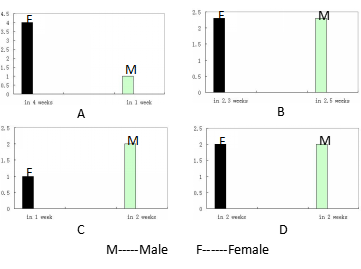早教吧作业答案频道 -->英语-->
Menandwomenarestilltreatedunequallyintheworkplace.Womencontinuetoearnless,onaverage,forthesameperformance,andtheyremainunderrepresentedintopjobs.Researchhasshownthatbothconsciousandsubconsciousbiases(偏见
题目详情
Men and women are still treated unequally in the workplace.Women continue to earn less,on average,for the same performance,and they remain underrepresented in top jobs.Research has shown that both conscious and subconscious biases (偏见) contribute to this problem.But we've discovered another,subtler source of inequality:Women often don't get what they want and deserve because they don't ask for it.In three separate studies,we found that men are more likely than women to negotiate for what they want.This can be costly for companies-and it requires management intervention.
The first study found that the starting salaries of male MBAs who had recently graduated from Carnegie Mellon were 7.6%,or almost 4,000dollars,higher on average than those of female MBAs from the same program.That's because most of the women had simply accepted the employer's initial salary offer; in fact,only 7% had attempted to negotiate.But 57% of their male counterparts-or eight times as many men as women-had asked for more.
Another study tested this gender difference in the lab.Subjects were told that they would be observed playing a word game and that they would be paid between 3dollars and 10dollars for playing.After each subject completed the task,an experimenter thanked the participant and said,"Here's 3dollars.Is 3dollars OK?"For the men,it was not OK,and they said so.Their requests for more money exceeded the women's by nine to one.
The largest of the three studies surveyed several hundred people over the Internet,asking respondents about the most recent negotiations they'd attempted or initiated and when they expected to negotiate next.The study showed that men place themselves in negotiation situations much more often than women do and regard more of their interactions as potential negotiations.
There are several reasons accounting for the phenomenon.First,women often are socialized from an early age not to promote their own interests and to focus instead on the needs of others.The messages girls receive-from parents,teachers,other children,the media,and society in general-can be so powerful that when they grow up they may not realize that they've internalized this behavior,or they may realize it but not understand how it affects their willingness to negotiate.Women tend to assume that they will be recognized and rewarded for working hard and doing a good job.Unlike men,they haven't been taught that they can ask for more.
72.According to this passage,what causes the inequality in the workplace?___
A.social bias
B.women's poorer working ability
C.women's worse academic background
D.women's less negotiating
73.Which can be the result of the following survey,according to Para 4?When do you expect to negotiate next?___

74.Which of the following statements is not true?___
A.Women accept the employer's initial salary offer willingly.
B.Men tend to ask for more money than woman.
C.Women care more about other's interest instead of themselves'.
D.Men believe that the better they work,the better they're paid.
75.What will be discussed in the following paragraph?___
A.The suggestions given to women.
B.The warnings to men.
C.Another reason for women's not asking.
D.Another reason for men's asking.
The first study found that the starting salaries of male MBAs who had recently graduated from Carnegie Mellon were 7.6%,or almost 4,000dollars,higher on average than those of female MBAs from the same program.That's because most of the women had simply accepted the employer's initial salary offer; in fact,only 7% had attempted to negotiate.But 57% of their male counterparts-or eight times as many men as women-had asked for more.
Another study tested this gender difference in the lab.Subjects were told that they would be observed playing a word game and that they would be paid between 3dollars and 10dollars for playing.After each subject completed the task,an experimenter thanked the participant and said,"Here's 3dollars.Is 3dollars OK?"For the men,it was not OK,and they said so.Their requests for more money exceeded the women's by nine to one.
The largest of the three studies surveyed several hundred people over the Internet,asking respondents about the most recent negotiations they'd attempted or initiated and when they expected to negotiate next.The study showed that men place themselves in negotiation situations much more often than women do and regard more of their interactions as potential negotiations.
There are several reasons accounting for the phenomenon.First,women often are socialized from an early age not to promote their own interests and to focus instead on the needs of others.The messages girls receive-from parents,teachers,other children,the media,and society in general-can be so powerful that when they grow up they may not realize that they've internalized this behavior,or they may realize it but not understand how it affects their willingness to negotiate.Women tend to assume that they will be recognized and rewarded for working hard and doing a good job.Unlike men,they haven't been taught that they can ask for more.
72.According to this passage,what causes the inequality in the workplace?___
A.social bias
B.women's poorer working ability
C.women's worse academic background
D.women's less negotiating
73.Which can be the result of the following survey,according to Para 4?When do you expect to negotiate next?___

74.Which of the following statements is not true?___
A.Women accept the employer's initial salary offer willingly.
B.Men tend to ask for more money than woman.
C.Women care more about other's interest instead of themselves'.
D.Men believe that the better they work,the better they're paid.
75.What will be discussed in the following paragraph?___
A.The suggestions given to women.
B.The warnings to men.
C.Another reason for women's not asking.
D.Another reason for men's asking.
▼优质解答
答案和解析
72------75 DADC72 D 细节理解题.根据文章第一段we've discovered another source of inequality:…because they don't ask for it.以及we found that men are more like...
看了Menandwomenares...的网友还看了以下:
超级难算的数学题12*A+13*B+14*C+15*D+16*E+19*F+24*G+32*H+* 2020-05-14 …
正方体ABCD_A1B1C1D1中,E,F分别是B1C1和D1C1的重点,P,Q分别是EF和BD的 2020-05-16 …
(14)下列( )关键码序列不符合堆的定义。 A)B、C、E、G、H、M、P、Q、S、Y B)B、C 2020-05-23 …
下列哪一个关键码序列不符合堆的定义?A.B、C,E,C、H、M、P、Q、S、YB.B、C、M、E、H 2020-05-23 …
德布罗意波长公式求教注:v频率E=hνv=c/λ所以E=hc/λh/λ=E/cp=hν/cc=vλ 2020-06-22 …
设一组初始记录关键字序列为(Q,H,C,Y,P,A,M,S,R,D,F,X),则按字母升序的第一趟 2020-07-17 …
设H是锐角三角形ABC的垂心,由A向以BC为直径的圆做切线AP,AQ,切点分别为P和Q,求证:P, 2020-07-26 …
一条线段上有9个点包括端点,从左至右依次为A,M,C.P,D,Q,E,N,B,且AC:CD:DE: 2020-07-30 …
矩形ABCD中,AB=4,AD=3,P,Q是对角线BD上不重合的两点,点P关于直线AD,AB的对称点 2020-12-25 …
复变函数幂函数w=z^a当z为有理数p/q(p与q为互质整数,q>0)条件如题,z^(p/q)=e^ 2021-02-01 …